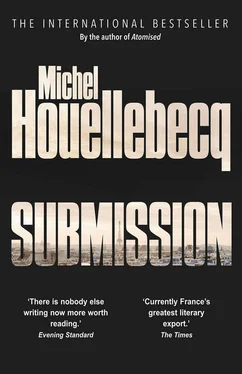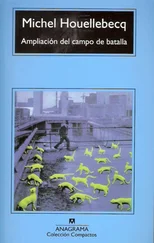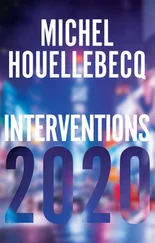There was a fairly rickety wooden desk with a Bible on it, a thin tract by Dom Jean-Pierre Longeat on the meaning of a monastic retreat (it was stamped ‘Do Not Remove’), and an information sheet that basically just listed the schedule of offices and meals. I saw at a glance that it was almost time for None, but I decided to give it a miss, this first day: the symbolism was less than thrilling. The idea behind the offices of Terce, Sext and None was to ‘return us to the presence of God over the course of the day’. Every day there were seven offices, plus Mass. None of that had changed since Huysmans’ time. The one concession to comfort was that Vigils, which had been observed at two in the morning, was now at 10 p.m. During my first visit, I had loved Vigils, with the long meditative psalms chanted in the middle of the night — as distant from Compline, and its farewell to the day, as it was from Lauds, which greeted the new dawn. Vigils was an office of pure waiting, of ultimate hope without any reason for hope. Obviously, in the dead of winter, back when the church wasn’t even heated, it can’t have been easy.
What impressed me most was that Brother Joel had recognised me after more than twenty years. Not much must have happened in his life since he stopped being guest master. He had worked in the monastery workshops, done the daily offices. His life had been peaceful, and probably happy, in stark contrast to my own.
I went for a long walk in the park, smoking numerous cigarettes, as I waited for Vespers, which was what came before the evening meal. The sun grew more and more dazzling. It made the frost sparkle, casting a yellow glow over the buildings, a scarlet glow over the carpet of dead leaves. I no longer knew the meaning of my presence in this place. For a moment it would appear to me, weakly, then just as soon it would disappear. In any case, it clearly had little to do with Huysmans any more.
Over the next two days I got used to the litany of prayers, but I never actually managed to love them. Mass was a recognisable element, the one point of contact with religious devotion as we in the outside world might know it. The rest was a matter of reading and chanting the appropriate psalms according to the time of day. Sometimes these were interspersed with a brief sacred text, read aloud by one of the monks — readings also occurred at meals, which were taken in silence. The modern church, constructed within the monastery walls, had a sober ugliness to it. Architecturally, it was reminiscent of the Super-Passy shopping centre in the rue de l’Annonciation, and its stained-glass windows, simple patches of abstract colour, weren’t worth looking at, but none of that bothered me. I wasn’t an aesthete — I had infinitely less aesthetic sense than Huysmans — and for me the uniform ugliness of contemporary religious art was essentially a matter of indifference. The voices of the monks rose up in the freezing air, pure, humble, well-meaning. They were full of sweetness, hope and expectation. The Lord Jesus would return, was about to return, and already the warmth of his presence filled their souls with joy. This was the one real theme of their chants, chants of sweet and organic expectation. That old queer Nietzsche had it right: Christianity was, at the end of the day, a feminine religion.
All of this might have suited me fine, but going back to my cell ruined it: the smoke detector glared at me with its little red hostile eye. Sometimes I went and smoked out the window, so I could confirm that here, too, things had gone downhill since Huysmans’ day: the TGV tracks lay just beyond the far edge of the monastery grounds, two hundred metres away as the crow flies. The trains went by at full speed, and their roar shattered the meditative silence several times an hour, every hour. But the cold grew more intense, and after each of these stations at the window I had to warm myself against the radiator for minutes at a time. My mood soured, and the prose of Dom Jean-Pierre Longeat — no doubt an excellent monk, full of love and good intentions — exasperated me more and more. ‘Life should be a continual loving exchange, in tribulations or in joy,’ the good father wrote. ‘So make the most of these few days and exercise your capacity to love and be loved, in word and deed.’ ‘Give it a rest, dickhead,’ I’d snarl, ‘I’m alone in my room.’ ‘You are here to lay down your burdens and take a journey within yourself, to the wellspring where the power of desire is revealed.’ ‘My only fucking desire is to have a fucking cigarette,’ I raged, ‘I’ve reached the fucking wellspring, dickhead, and that’s what’s there.’ I may not have had, like Huysmans, ‘a heart hardened and smoked dry by dissipation’, but lungs hardened and smoked dry by tobacco — those I had.
‘Hear, taste and drink, weep and chant, knock at the door of Love!’ exclaimed the ecstatic Longeat. On the morning of the third day I realised I had to leave. The whole thing had been a mistake all along. I explained to Brother Pierre that, to my dismay, unforeseen professional obligations, of literally unbelievable importance, required me to cut my spiritual journey short. With that Pierre Moscovici face of his, I knew he’d believe me. He might even have been Pierre Moscovici, in his previous life, and Pierre Moscovicis are all on the same page. I was sure we’d get through this without any unpleasantness. As we were saying goodbye in the entrance hall, he expressed a hope that my journey among them had been a journey in the light. Not to worry, I assured him, I’d had a terrific time. And yet, at that moment, I felt that I was somehow letting him down.
During the night, a low-pressure system, originating over the Atlantic, had moved in from the south-west. The temperature had risen by six degrees; the countryside around Poitiers was wrapped in fog. I had called ahead for a taxi, and now I found myself with almost an hour to kill. I spent it at the Bar de l’Amitié, whose front door was fifty metres from the monastery, mindlessly downing Leffes and Hoegaardens. The waitress was thin and wore too much make-up. The other customers were talking in loud voices, mainly about property and holidays. It gave me no satisfaction to be back among people like myself.
‘If Islam is not political, it is nothing.’
— Ayatollah Khomeini
At the Poitiers railway station, I had to change my ticket. The next TGV to Paris was almost full, so I paid for the upgrade to Pro Première. According to the national rail service, it was a universe of privilege, with a guaranteed highspeed connection, larger tables for spreading out work papers, and electrical sockets so that you’d never find your laptop dying on you because you’d stupidly forgotten to charge it; otherwise, it was normal first class.
I found a seat by myself, with no one opposite me. On the other side of the aisle a middle-aged Arab businessman, dressed in a long white djellaba and a white keffiyeh, had spread out several files on the two tables in front of his seat. He must have been coming from Bordeaux. There were two young girls facing him, barely out of their teens — his wives, clearly — who had raided the news-stand for sweets and magazines. They were excited and giggly. They wore long robes and multicoloured veils. For the moment, one was absorbed in a Picsou comic, the other in the latest issue of Oops .
Opposite them, the businessman looked as if he was under some serious stress. Opening his email, he downloaded an attachment containing several Excel spreadsheets, and after examining these documents, he looked even more worried than before. He made a call on his mobile phone. A long, hushed conversation ensued. It was impossible to tell what he was talking about, and I tried, without a great deal of enthusiasm, to get back to my Figaro , which covered the new regime from a property and luxury angle. From this point of view, the future was looking extremely bright. The subjects of the petro-monarchies were more and more eager to pick up a pied-à-terre in Paris or on the Côte d’Azur, now that they knew they were dealing with a friendly country, and were outbidding the Chinese and the Russians. Business was good.
Читать дальше







